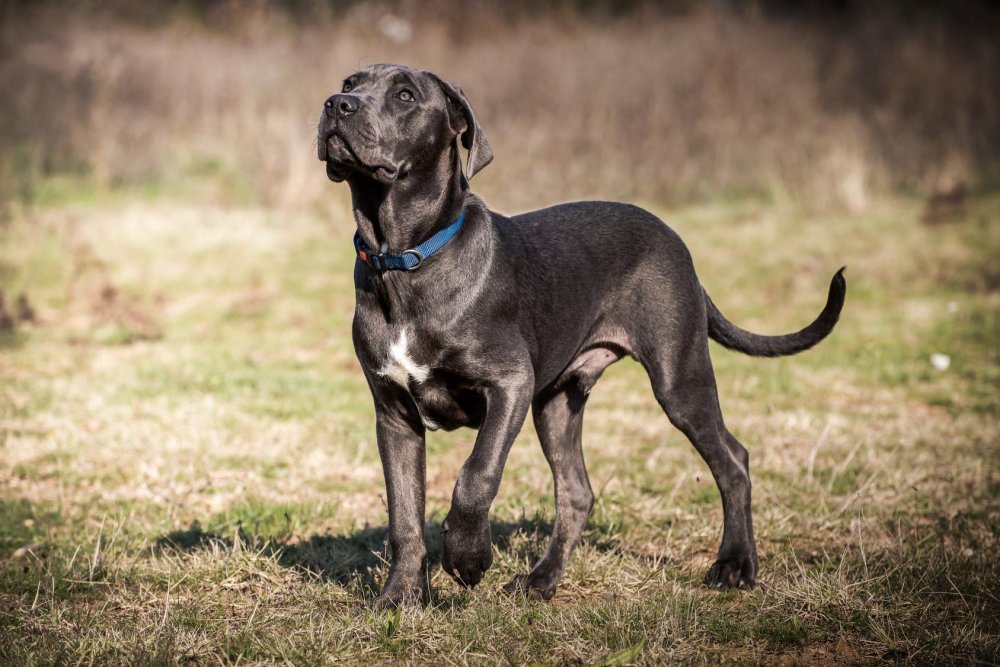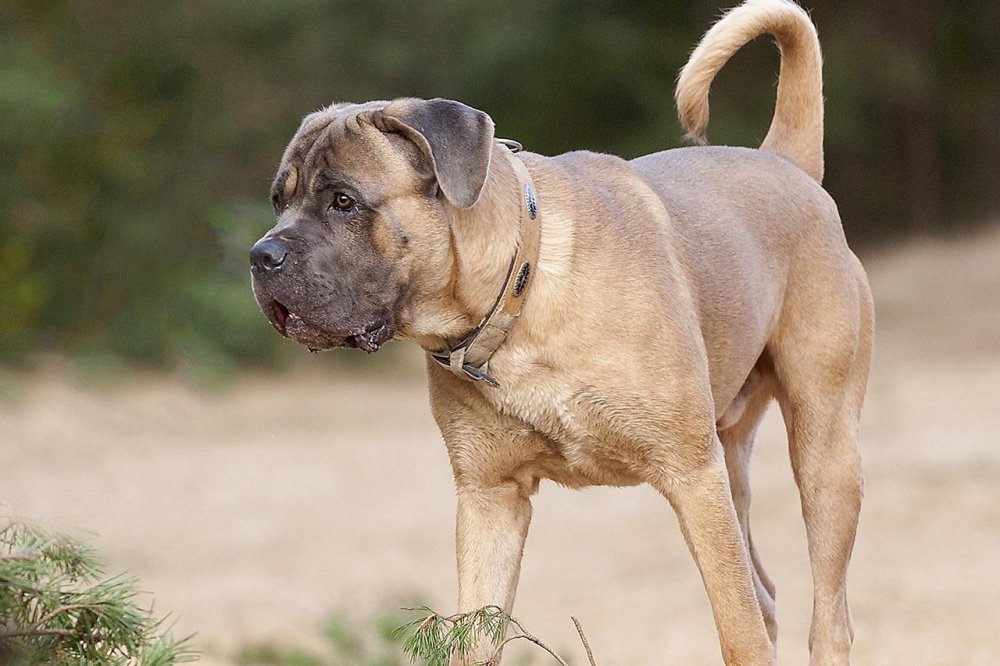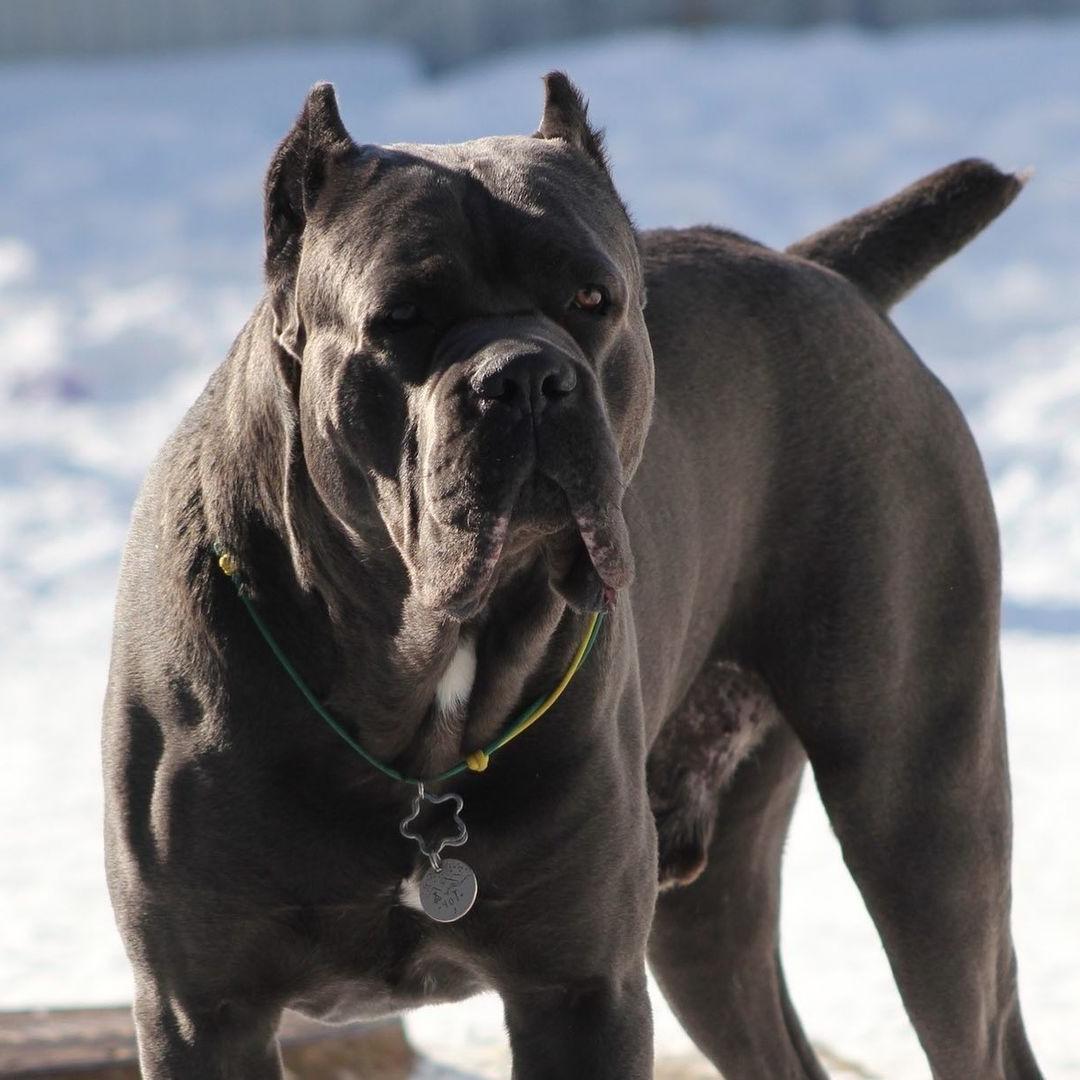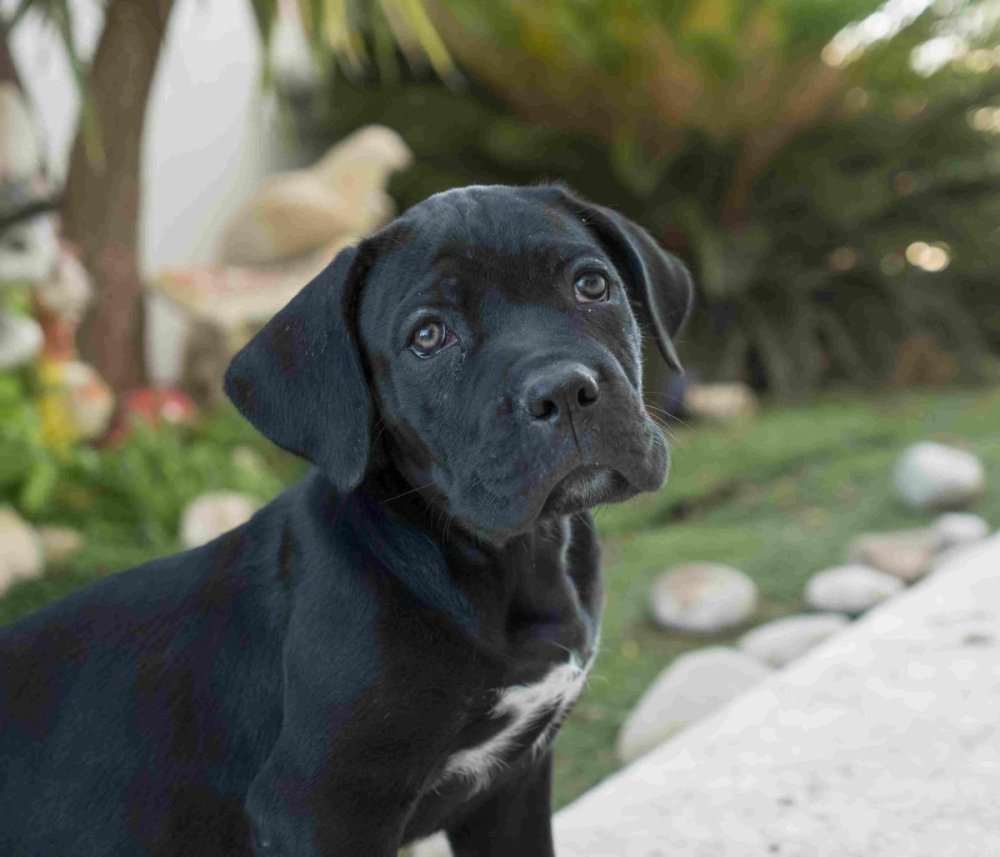- Breed Category: Working Group
- Country of Origin: Italy
- Average Height: Males 64-68 cm, Females 60-64 cm
- Average Weight: Males 45-50 kg, Females 40-45 kg
- Average Life Span: 9-12 years
- Grooming Requirements: Low, occasional brushing
- Exercise Requirements: High, needs daily exercise
- Coat Type: Short and dense
- Coat Color Variations: Black, fawn, grey, brindle
- Shedding Level: Moderate
- Ear Type: Naturally floppy, often cropped
- Tail Type: Thick, often docked
- Temperament: Loyal, protective, confident
- Intelligence Level: High
- Barking Tendency: Low
- Compatibility with Children: Good with proper training
- Compatibility with Other Pets: Varies, early socialisation needed
- Training Ease: Requires experienced handler
- Common Health Issues: Hip dysplasia, bloat
- Dietary Needs: High-quality, protein-rich diet
- Energy Level: Moderate to high
- Drooling Tendency: Moderate
- Sensitivity to Weather: Sensitive to extreme heat
- Overall Maintenance Level: Moderate
- Original Purpose: Guarding, hunting large game
- Year of Recognition by Kennel Clubs: 1996 (FCI), 2010 (AKC)
- Apartment Friendly: Not ideal, needs space
- Best Suited For: Active families, experienced owners
- Cost of Ownership: Moderate to high
- Unique Traits: Muscular build, protective nature
- Cultural Significance: Ancient Roman war dogs
- Popularity Rank: Increasing in popularity
Did you know that the Cane Corso is one of the oldest dog breeds, with roots tracing back to ancient Roman times? This majestic breed, known for its strength and loyalty, has a fascinating history that’s as impressive as its appearance. The Cane Corso is a large, muscular dog, often used as a guard dog due to its protective nature. But there’s more to this breed than meets the eye. In this article, we’ll dive into the unique characteristics that make the Cane Corso stand out, explore its rich history, and provide insights into how to care for this remarkable breed. Whether you’re considering adding a Cane Corso to your family or just curious, read on to discover more.
History and Origin of the Cane Corso

Early Development of the Cane Corso Breed
The Cane Corso’s story begins in ancient Rome, where it was bred as a versatile working dog. These dogs were known for their strength and agility, traits that were highly valued in Roman society. Over the centuries, the breed evolved, adapting to the needs of the people and the changing landscapes of Italy. The Cane Corso we know today is a result of careful breeding, aimed at preserving its robust physique and keen intelligence.
Role in Italian Farming and Guarding
In rural Italy, the Cane Corso became an indispensable part of farm life. Farmers relied on these dogs to guard livestock and property, thanks to their natural protective instincts. Their ability to work tirelessly in various roles, from herding to guarding, made them a favourite among Italian farmers. The breed’s loyalty and courage were unmatched, ensuring the safety of both animals and humans alike.
Key Historical Figures and Events
Throughout history, the Cane Corso has been shaped by various influences. Notable breeders in the 20th century played a crucial role in reviving the breed, which had dwindled in numbers. Their dedication ensured the Cane Corso’s survival and resurgence in popularity. Today, the breed is celebrated not just in Italy but around the world, admired for its rich heritage and remarkable abilities.
Physical Characteristics of the Cane Corso

Appearance
The Cane Corso is a striking breed, known for its large and imposing presence. Typically, these dogs stand between 60 to 70 centimetres tall at the shoulder and can weigh anywhere from 40 to 50 kilograms. Their coat is short and dense, coming in a variety of colours including black, grey, fawn, and brindle. Some may have distinctive markings like a white patch on the chest or toes, adding to their unique look.
Unique Physical Traits
One of the most notable features of the Cane Corso is its strong, muscular build. This breed is designed for power and agility, with a broad chest and a sturdy frame that exudes strength. Their head is large and square, with a pronounced jawline that gives them a commanding presence. Despite their size, Cane Corsos are surprisingly graceful, moving with a fluidity that belies their robust physique.
Temperament and Behaviour of the Cane Corso

Typical Personality Traits
The Cane Corso is renowned for its loyalty, intelligence, and protectiveness. These dogs form strong bonds with their families, often becoming deeply attached to their human companions. Their intelligence makes them highly trainable, though they do require consistent and firm guidance. Protective by nature, they are naturally inclined to guard their home and loved ones, making them excellent watchdogs.
Suitability as a Family Pet and Guard Dog
As a family pet, the Cane Corso can be a wonderful addition, provided they are well-socialised from a young age. Their protective instincts make them vigilant guardians, but they also have a gentle side that shines through with proper training. They thrive in environments where they have a clear role and purpose, making them ideal for families who can provide structure and leadership.
Interaction with Children and Other Animals
When it comes to children, Cane Corsos are generally patient and tolerant, especially if raised alongside them. However, due to their size and strength, supervision is recommended during interactions with young kids. With other animals, early socialisation is key. They can coexist peacefully with other pets if introduced properly, but their dominant nature means they may not always get along with unfamiliar dogs.
Training and Exercise Needs of the Cane Corso
Importance of Early Training and Socialisation
Getting a Cane Corso off to a good start with early training and socialisation is crucial. These dogs are naturally protective and can be wary of strangers, so exposing them to different people, environments, and experiences from a young age helps them grow into well-rounded adults. This early exposure is key to ensuring they are confident and comfortable in various situations.
Recommended Training Techniques
When it comes to training, consistency and positive reinforcement are your best friends. Cane Corsos respond well to firm but gentle guidance. Use treats, praise, and play as rewards to encourage good behaviour. It’s important to establish yourself as the leader early on, as these intelligent dogs can be quite independent. Regular training sessions will keep their minds sharp and strengthen your bond.
Daily Exercise Requirements and Activities They Enjoy
Cane Corsos are active dogs that need plenty of exercise to stay healthy and happy. Aim for at least an hour of physical activity each day. They love long walks, runs, and playtime in a secure yard. Engaging them in activities like agility or obedience training can also be a great way to burn off energy and keep them mentally stimulated. Remember, a tired Cane Corso is a well-behaved Cane Corso.
Health and Lifespan of the Cane Corso

Common Health Issues
Cane Corsos are generally healthy, but like all breeds, they’re prone to certain health issues. Hip dysplasia is a common concern, where the hip joint doesn’t fit together perfectly, leading to arthritis over time. Eye problems like entropion, where the eyelid rolls inward, can also occur. Regular vet check-ups are essential to catch these issues early.
Average Lifespan and Health Tips
The average lifespan of a Cane Corso is around 9 to 12 years. To keep them healthy, a balanced diet and regular exercise are crucial. These dogs thrive on high-quality food that meets their nutritional needs. Regular physical activity helps maintain their weight and keeps their muscles strong. Mental stimulation is just as important, so engage them with training and interactive toys.
Preventative Care Recommendations
- Schedule regular vet visits for vaccinations and health screenings.
- Maintain a consistent exercise routine to prevent obesity.
- Brush their teeth regularly to prevent dental issues.
- Check their ears weekly for signs of infection.
- Keep their coat clean and groomed to avoid skin problems.
By following these preventative measures, you can help ensure your Cane Corso lives a long, healthy life.
Grooming and Maintenance of the Cane Corso

Coat Care and Grooming Routines
The Cane Corso’s short, dense coat is relatively low-maintenance, but regular grooming is still essential. A weekly brush with a rubber curry brush or a bristle brush will help remove loose hair and keep their coat looking sleek. This routine not only maintains their appearance but also strengthens the bond between you and your dog.
Shedding and Seasonal Grooming Tips
While Cane Corsos are not heavy shedders, they do experience seasonal shedding, typically in spring and autumn. During these times, you might notice more hair around the house. Increase brushing sessions to two or three times a week to manage the extra shedding. This will help keep your home cleaner and your dog’s coat healthy.
Bathing should be done as needed, usually every couple of months, or when they get particularly dirty. Use a gentle dog shampoo to avoid skin irritation. Regular grooming not only keeps your Cane Corso looking their best but also allows you to check for any skin issues or parasites.
Diet and Nutrition for the Cane Corso

Nutritional Needs for Optimal Health
Feeding a Cane Corso isn’t just about filling a bowl. It’s about providing the right balance of nutrients to support their robust physique and active lifestyle. These dogs need a diet rich in high-quality protein to maintain their muscle mass, along with healthy fats for energy. Vitamins and minerals are essential too, supporting everything from bone health to a shiny coat.
Foods to Include and Avoid
When it comes to feeding your Cane Corso, focus on whole foods. Lean meats, fish, and eggs are excellent protein sources. Include vegetables like carrots and spinach for added vitamins. Avoid foods high in fillers and artificial additives, as these can lead to health issues. Steer clear of chocolate, grapes, and onions, which are toxic to dogs.
Feeding Schedules and Portion Recommendations
Establishing a regular feeding schedule is key. Adult Cane Corsos typically do well with two meals a day. Puppies may need more frequent, smaller meals to support their growth. Portion sizes depend on their age, weight, and activity level, so it’s wise to consult with your vet for tailored advice. Remember, overfeeding can lead to obesity, so keep an eye on their weight and adjust portions as needed.
Fun Facts and Trivia about the Cane Corso
Interesting Tidbits about the Breed
The Cane Corso is not just a pretty face; it’s a breed with a rich history and some fascinating quirks. Did you know that their name comes from the Latin “Cohors,” meaning “protector” or “guardian”? This perfectly captures their role throughout history. Despite their imposing size, Cane Corsos are known for their gentle nature with family members, making them a unique blend of power and affection.
Another fun fact is their incredible versatility. Historically, they were used for everything from hunting large game to herding cattle. This adaptability is still evident today, as they excel in various canine sports and activities.
Famous Cane Corsos in Media or History
While the Cane Corso may not be as frequently seen in movies as some other breeds, they have made their mark. One notable appearance is in the film “The First Purge,” where a Cane Corso plays a protective role, showcasing the breed’s natural guarding instincts. In history, these dogs have been companions to Italian nobility, further cementing their status as a breed of distinction.
Final Thoughts

The Cane Corso is a remarkable blend of power and loyalty. This ancient breed offers both protection and companionship, making it a unique addition to any family. While their strength and intelligence require experienced handling, the rewards of owning a Cane Corso are immense, from their unwavering loyalty to their gentle nature with loved ones. Embracing the Cane Corso means committing to a journey of mutual respect and understanding, ensuring a fulfilling relationship. If you’re ready for the challenge, this breed promises a lifetime of devotion and protection.
